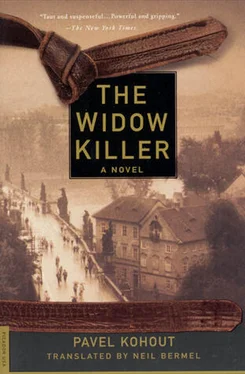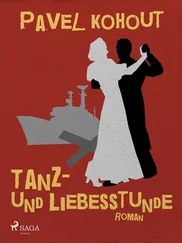The banal story’s sudden change into drama managed to raise Buback’s weary eyelids.
“What change? Did he find someone else?”
“No, that wasn’t it. During our whole time together he never deceived me, not once. But I was the last in a line of conquests that always ended with him returning to his true love, the theater. I should have seen how easy it was to pry him away from his wife — it was more like I set her free. When he was learning and playing a big part, it was as if I didn’t exist. Othello and Mercurio occupied him far more than any passing fling could; a woman I could have buried, like any other competitor. Martin, that fantastic lover, stopped needing to make love when he was with me. Fleeced a second time! And what’s worse, I was still just his mistress; ’we’ve both had our marriages already,’ he’d say, ’haven’t we, darling?’ ”
Then war broke out for real. Actors of Martin’s caliber did not have to enlist so long as they joined troupes entertaining German soldiers behind the front lines. Grete forced him to arrange for her to go as well, singing in a group with the depressing name Freudenkiste —“Box o’ Joy.” She thought that, removed from the surroundings where he was king, he would come to appreciate her presence. They could return to their starting point, those rapturous nights in Hamburg. The director of the group, however, soon struck Martin’s modest handful of famous monologues, which had been his substitute for performing the classics; they bored the soldiers. Instead, he was condemned to recite trite little verses, meant to give men who used traveling whorehouses for sex an analogous replacement for emotions.
Martin was unbearable. Because he couldn’t punish that Nazi, she said — lighting a new cigarette while Buback rubbed his eyes quickly, so she wouldn’t see — he tormented her instead. He must have known how she longed for him and he must have wanted her himself at times, but he had an inhuman self-control; crawling into bed, he would turn away from her and fall asleep without so much as a good night.
Desperate and vengeful, what else could she do but have an affair— but with whom? Even after days of bathing in the Lido, the soldiers and officers currently recuperating in Rome after their Sicilian battles stank of God knows what, most likely death. And she would rather have died than sleep with a troupe member. Then she saw her chance.
After a performance for their Italian allies, she received a bouquet of roses. A calling card in it requested her to accept a supper invitation: they could meet at the Hotel Dei Principi, a chauffeur was waiting outside in a silver Lancia— cordialemente Gianfranco Bossi. Ordinarily she would have refused, if Martin had not remarked that she ought to go; this might just be the supermale who could finally slake her nymphomania. She changed and went.
The driver in livery delivered her to the doorman, the doorman took her to the concierge, the concierge brought her personally to the head-waiter. She ended up at a table where a slender, dark man with unbelievably green eyes rose to greet her; he could have been thirty or fifty. If she would like, he said, kissing her hand, they could take dinner together here. With her consent, of course, he would be pleased to invite her for dinner at his home. She liked what she saw, and, furious at Martin, she accepted.
Home, she continued raptly, as if seeing it once again, was in an old palace filled with servants, whose silence reminded her of ghosts: a scene from a film, with silver, candles, the music of a hidden quartet. And after a feast like that, there would have to be a canopied bed…. Was she boring him, she asked Buback. Of course not, he said swiftly, for fear of being left alone the next evening.
The Italian remained virtually silent; he ran the dinner with gestures of his handsome fingers. She did the talking: about Hamburg and Berlin, about books and the theater, ever more intrigued to know how this man, evidently an aristocrat, would negotiate the next bend in the road toward their evident goal.
He did it quite differently than she expected. At a certain point he stood up, walked over, helped her pull out her chair, and offered her his arm. Then he led her out past the entrance hall to the door of the palace, where the blacked-out vehicle was waiting to take her back.
He invited her night after night, four evenings running; only the food and music changed. Once the last cup had vanished from the table, the music disappeared as well. From the hallway, the sounds of a small fountain burbled into the dining room. He no longer moved, just gazed at her. Confused, she spun the conversation onward alone, until he rose from the table.
They had two days remaining in Rome when it dawned on her: the moment silence descended, she fell quiet as well. They looked at each other mutely for several long minutes.
He knew she was leaving in two days’ time he remarked suddenly; he would return to Sicily the next day. But the Allies are there already, she replied, shocked. Oh really, he smiled; what’s the difference, a change might be nice. He would like her to accompany him. As? As his betrothed.
She was flabbergasted. But she was here with her husband!
The Italian was apparently well informed. The actor wasn’t really her husband, though, was he? No, not officially; they hadn’t felt it necessary to formalize things, but she had been with him several years already. So why did he let her go out at night with a stranger? If she were Sicilian, her brothers would have killed him long ago. He meant his offer seriously and would prove it by confiding in her: he was a member of an old noble family here on a secret military mission. Couldn’t she stay here with him? Early tomorrow he’d arrange for her luggage and documents.
No, she said, no, she was truly sorry. No tonight or no forever? he asked. He is my fate, she whispered. Only death can release us. In a rush of emotion she then asked if he would like her to stay tonight, at least. He nodded almost solemnly and led her up a marble staircase and along hallways with ancestral portraits; the palace was desolate— and then there it was, the canopied bed, and she felt an indescribable gratitude to him for the way he had exalted her and confirmed her uniqueness. She had never made love more passionately — to be precise, she corrected herself, she had never pretended passion more expertly.
Before she began to get dressed, the Italian made a cross of kisses on her mouth, breasts, and lap.
At home she woke Martin. She repeated everything that was said in the dining room and waited to hear what he would say. And he… even now she swallowed angrily and fumbled for another cigarette— he congratulated her and asked if she needed help packing.
“And I began to hit him, Buback! I hit and kicked him. Until it hurt me just as much. I was punishing part of myself in him too. For the fact that together we killed such a perfect love. He defended himself; he was strong, so he quickly got me in a lock on the ground. Except that I can’t be tamed, you know that. I spat, scratched, even bit him. He howled, and I was sure he’d wound me too. But suddenly he let me up, opened himself to my blows and whispered, Thank you, thank you, until I screamed furiously, for what? And he said: for still caring that much. At that I burst into tears. And then we made love till morning like in Hamburg.”
Early the next morning the chauffeur woke her; he had brought a ring from the Sicilian. A large diamond was set in platinum between two emeralds the color of his eyes. She knew it cost more than all the money she had ever earned. For the few minutes she held it in her hand, she felt the way she had always longed to feel: the chosen one among women. Then she showed it to Martin and sent it back.
Читать дальше












